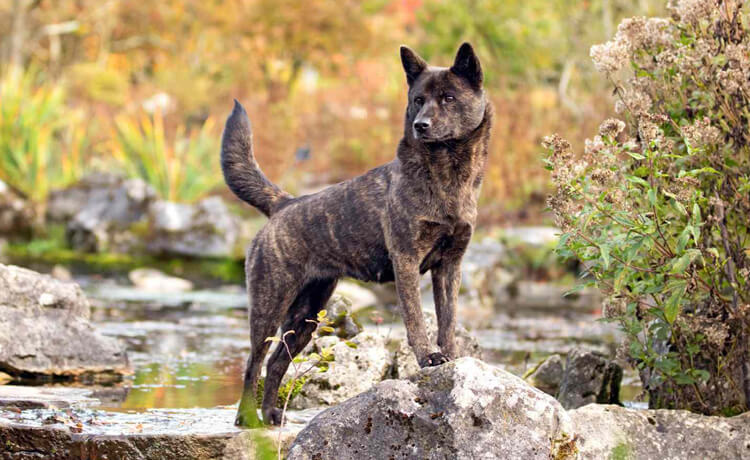
Kai Ken
The Kai Ken, also known as the Tiger Dog, is a rare and ancient breed from Japan. Renowned for its unique brindle coat and unwavering loyalty, the Kai Ken is a versatile and intelligent dog well-suited for active families or individuals who appreciate their natural hunting instincts and devotion.
Breed Overview
- Origin:Japan
- Height:17–22 inches
- Weight:25–45 pounds
- Lifespan:12–15 years
- Coat Type:Double coat, medium length
- Colors:Brindle (black, red, or a mix, often tiger-striped)
- Temperament:Loyal, intelligent, reserved, athletic
- Purpose:Hunting, companionship
History and Origin
The Kai Ken is one of Japan’s six native spitz-type breeds, originating from the mountainous regions of the Yamanashi Prefecture. Historically, they were used for hunting wild game, including boar and deer, thanks to their exceptional tracking skills and agility.
The breed's natural brindle pattern helps them blend into forested environments, earning them the nickname "Tiger Dog." While they were once isolated in rural Japan, efforts to preserve this national treasure have brought the Kai Ken recognition worldwide, though they remain rare outside Japan.
Physical Characteristics
The Kai Ken is medium-sized, with a balanced and athletic build.
- Head:Wedge-shaped with a keen and alert expression.
- Ears:Triangular and erect, giving a sharp, alert look.
- Eyes:Dark, almond-shaped, and filled with intelligence.
- Body:Compact and muscular, built for endurance and agility.
- Coat:Dense double coat with a soft undercoat and a coarse outer layer.
- Tail:Curled or sickle-shaped, typical of spitz breeds.
Temperament and Personality
The Kai Ken is a loyal and intelligent companion with a reserved nature.
Essentials for Your Newly Adopted Pet
Welcoming a shelter pet into your life is a beautiful journey. Here are some handpicked items to help your new friend feel safe, loved, and right at home:
- Loyal and Protective:Strongly bonds with their family and acts as a natural guardian.
- Intelligent and Trainable:Quick to learn but can be independent-minded.
- Reserved with Strangers:Cautious around unfamiliar people, though not aggressive.
- Athletic and Agile:Thrives on physical challenges and outdoor activities.
- Affectionate and Gentle:Devoted to their owners and good with children when socialized early.
Living with a Kai Ken
The Kai Ken is best suited to active families or individuals who enjoy spending time outdoors.
Space Needs
They adapt well to various living situations, from apartments to homes with large yards, as long as they receive enough exercise.
Exercise Requirements
This breed requires at least 1–2 hours of daily activity, including walks, runs, or vigorous play. Outdoor adventures like hiking are ideal for their energetic and adventurous nature.
Training and Socialization
Kai Kens are intelligent but can have a stubborn streak, so consistent and positive training is essential. Early socialization helps them adapt to new people, pets, and environments.
Grooming: Moderate Maintenance
The Kai Ken’s double coat requires regular care to maintain its health and beauty.
- Brushing:Weekly brushing is sufficient, though more frequent grooming is needed during shedding seasons.
- Bathing:Bathe only when necessary to preserve the natural oils in their coat.
- Nail Care:Trim nails regularly to prevent overgrowth.
- Dental Hygiene:Brush teeth several times a week to maintain oral health.
- Ear Cleaning:Check and clean their ears regularly to prevent infections.
Health and Common Issues
The Kai Ken is a healthy breed but may encounter some breed-specific concerns:
- Hip Dysplasia:A common issue in medium-sized dogs.
- Allergies:Skin or environmental allergies may occur.
- Thyroid Issues:Occasionally seen in spitz breeds.
Routine veterinary care, a balanced diet, and regular exercise are key to maintaining their health.
Activities and Sports
Kai Kens excel in activities that stimulate their physical and mental abilities:
- Hiking and Trail Running:Perfect for their athletic build and love for the outdoors.
- Agility Training:Their agility and quick reflexes make them stars in agility sports.
- Tracking and Nose Work:A nod to their hunting heritage.
- Interactive Play:Games like fetch or puzzle toys challenge their minds.
Conclusion
The Kai Ken is a unique and devoted breed with a rich history and unmatched loyalty. Whether you’re hiking in the mountains or relaxing at home, this "Tiger Dog" is a versatile and affectionate companion. With proper care, training, and attention, the Kai Ken will thrive as a loving and dynamic addition to any family.
Affiliate Products
Up to 75% Discount

Dog Collar with Health Monitoring
BUY NOW »
Up to 55% Discount

Luxury Faux Furhuge Napping Bed
BUY NOW »

